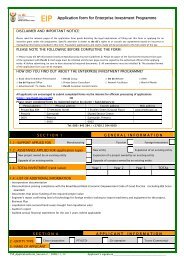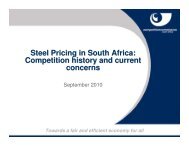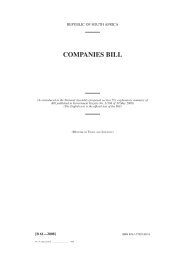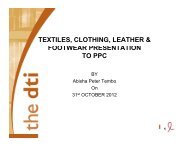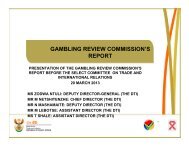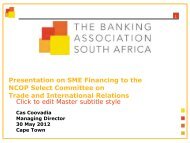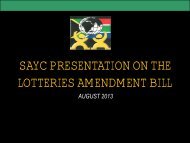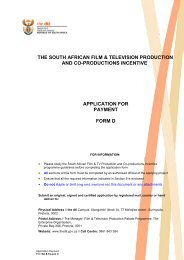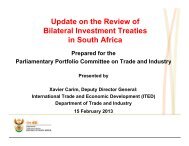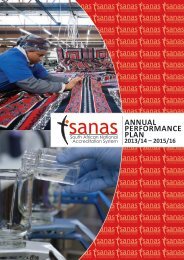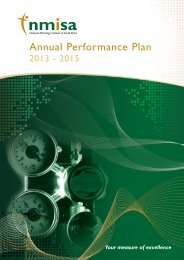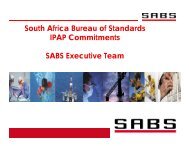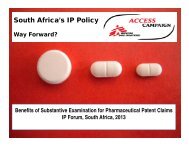Copyright Review Commission Report - ICT Law and Regulation ...
Copyright Review Commission Report - ICT Law and Regulation ...
Copyright Review Commission Report - ICT Law and Regulation ...
- No tags were found...
Create successful ePaper yourself
Turn your PDF publications into a flip-book with our unique Google optimized e-Paper software.
niches in the market to ensure fair <strong>and</strong> correct distribution of royalties. Reinterpretations of the work of older <strong>and</strong> moreestablished musicians, <strong>and</strong> new emerging trends in music coming from the peripheral areas as well as gospel music offeredgrowth points in a creative business strategy for ABRAMUS. Live concerts <strong>and</strong> shows, <strong>and</strong> the composition of music for dailytelevision programmes have been focus points for ABRAMUS (Annual <strong>Report</strong> 2009).1.10. CORPORATE GOVERNANCEAccording to the current laws, the associations are not regulated <strong>and</strong> operate squarely on a non-governmental basis, withinthe ambit of civil society <strong>and</strong> free enterprise. Disputes are settled through the justice system (interview with Barbosa, MR,Diretoria de Direitos Intelectuais, Ministry of Culture, 7 May 2011). Users challenge prices through the courts. The courts arethe only mechanism that h<strong>and</strong>les disputes <strong>and</strong> the process takes a long time. At present, Brazil is in the process of reformingits copyright law. The reform proposals include more interventions from government, <strong>and</strong> strive to achieve a balance betweenprotecting copyright <strong>and</strong> access to culture <strong>and</strong> knowledge.1.11. DEVELOPMENTAL ASPECTS OF COPYRIGHT AND INTELLECTUAL PROPERTYSouth Africa <strong>and</strong> Brazil cooperate on developmental programmes concerning the role of IP in achieving sustainablelivelihoods. For IP to facilitate development, emphasis has been placed on the role of grassroots national projects <strong>and</strong> thework of NGOs.The Centre for Technology <strong>and</strong> Society (CTS), which is part of the Rio de Janeiro School of <strong>Law</strong> at Fundacao GetuilioBargas (FGV), is such a national grassroots project. The schools of law based in Rio de Janeiro <strong>and</strong> Sao Paolo promote lawreform in Brazil for sustainable development <strong>and</strong> democracy. One of its foci, the reform of the traditional IP institution, dealswith the interplay of law, technology <strong>and</strong> society. With a team of interdisciplinary staff, the school coordinates graduate <strong>and</strong>post-graduate programmes, including IP courses.Prof. Paranagua has argued that the CTS has demonstrated, in practice, in the context of sustainable development, thatopen models can work better than traditional IP-based ones. The centre has been active in shaping the Access to Knowledge(A2K) movement in Brazil <strong>and</strong> beyond, <strong>and</strong> is able to share best practice. It has further been chosen to be part of thelaunching of the A2K Global Academy, together with other members from China, Egypt, India, South Africa <strong>and</strong> the US.The Academy aims to explore new lines of research, including a comprehensive study on the potential liability of Internetservice providers. Brazil <strong>and</strong> most countries of the A2K Global Academy have not yet resolved the issue of shutting off theInternet for users involved in file sharing versus the liability of Internet service providers. The A2K Global Academy aims todevelop comparative models <strong>and</strong> a new draft Bill that will regulate the liability of Internet providers.The Brazilian Ministry of Culture has further commissioned CTS to do a study on copyright <strong>and</strong> access to knowledge, whichwas presented to officials from the Ministry in 2006. The CTS Website became a national reference for access to knowledgeissues in the country <strong>and</strong> is utilised by government <strong>and</strong> civil society. The website covers issues ranging from technologicalprotection measures, digital locks, exceptions <strong>and</strong> limitations to copyrights, access to educational materials, <strong>and</strong> culturaldiversity. Under this programme, numerous presentations have been made at conferences <strong>and</strong> lectures.- 130 -



